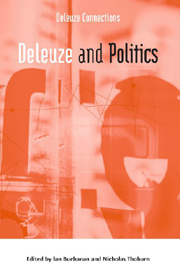Book contents
- Frontmatter
- Contents
- Dedication
- Acknowledgements
- Introduction: Deleuze and Politics
- 1 Power, Theory and Praxis
- 2 Deleuze and the Political Ontology of ‘The Friend’ (philos)
- 3 Molecular Revolutions: The Paradox of Politics in the Work of Gilles Deleuze
- 4 Schizoanalysis, Nomadology, Fascism
- 5 What is a Militant?
- 6 Bourgeois Thermodynamics
- 7 The Age of Cynicism: Deleuze and Guattari on the Production of Subjectivity in Capitalism
- 8 Deleuze, Materialism and Politics
- 9 Becoming-Democratic
- 10 Theorising European Ethnic Politics with Deleuze and Guattari
- 11 People and Fabulation
- 12 Micropolitical Associations
- Notes on Contributors
- Index
2 - Deleuze and the Political Ontology of ‘The Friend’ (philos)
Published online by Cambridge University Press: 12 September 2012
- Frontmatter
- Contents
- Dedication
- Acknowledgements
- Introduction: Deleuze and Politics
- 1 Power, Theory and Praxis
- 2 Deleuze and the Political Ontology of ‘The Friend’ (philos)
- 3 Molecular Revolutions: The Paradox of Politics in the Work of Gilles Deleuze
- 4 Schizoanalysis, Nomadology, Fascism
- 5 What is a Militant?
- 6 Bourgeois Thermodynamics
- 7 The Age of Cynicism: Deleuze and Guattari on the Production of Subjectivity in Capitalism
- 8 Deleuze, Materialism and Politics
- 9 Becoming-Democratic
- 10 Theorising European Ethnic Politics with Deleuze and Guattari
- 11 People and Fabulation
- 12 Micropolitical Associations
- Notes on Contributors
- Index
Summary
Late in his life – in 1988, after Foucault and in the midst of co-writing with Guattari What Is Philosophy? – Deleuze had a brief exchange of letters with Dionys Mascolo (the author of Le Communisme and Autour d'un effort de mémoire: Sur une lettre de Robert Antelme), a correspondence which quickly turned to the subject of ‘the friend’ (philos). It is from this context that I would like to construct a genealogy of this concept in Deleuze's later writings, particularly in relation to Deleuze's assertion that the democratic ideal of friendship has been totally ‘corrupted’ (pourri), a term that Deleuze employs with greater frequency in his last works. According to one of the major arguments put forward in What Is Philosophy? the political idea of friendship, understood as the democratic consensus of friends or equals, as well as the instruments of speech and communication, have become corrupted by being completely permeated by money (for example, appearing today as the inter-subjective idealism of free markets). But what happens in this new situation to the possibility of the friend, a concept that originates in Occidental thought from the period of the Greeks, which already determines the intersubjective idealism of politics? And what of Communism?
- Type
- Chapter
- Information
- Deleuze and Politics , pp. 35 - 53Publisher: Edinburgh University PressPrint publication year: 2008



